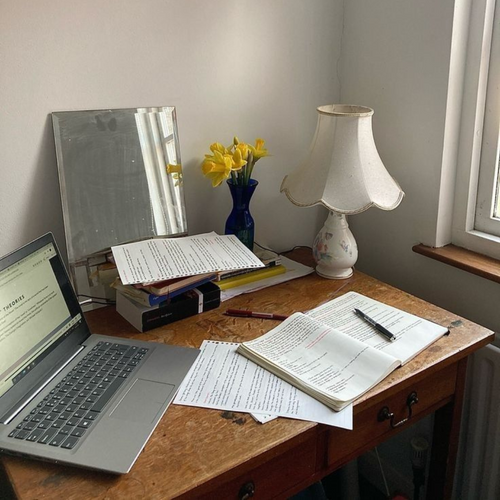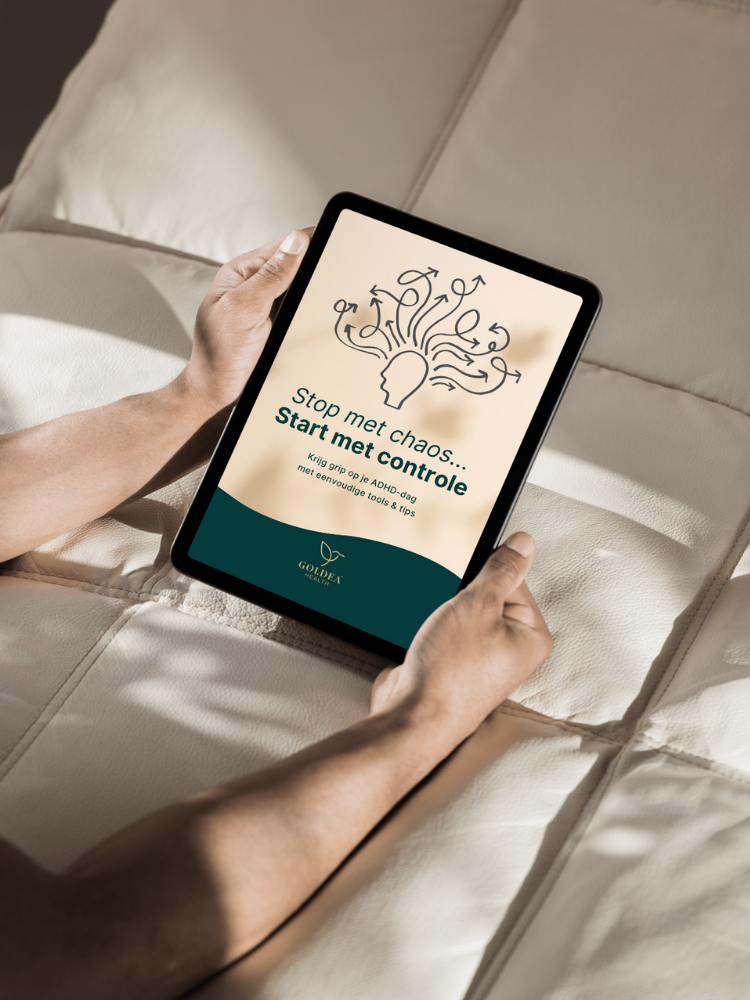Nieuw bij Goldea? 15% kennismaking met code: FRESHSTART15

Nieuw bij Goldea? 15% kennismaking met code: FRESHSTART15

ADHD, a term often associated with bouncy, active children, is often misunderstood, especially when it comes to women. Did you know that ADHD is often less readily recognized in women and therefore sometimes diagnosed much later in life? This is because ADHD often presents differently in women than in men, leading to symptoms going unnoticed or even being dismissed as personality traits.
That's why in this blog we provide more information and insights about ADHD in women, symptoms and our practical tips, tools and advice.
ADHD stands for " Attention Deficit Hyperactivity Disorder ." With ADHD, the brain functions differently, specifically in the areas responsible for focus, impulse control , and planning . The neurotransmitters dopamine and norepinephrine are present in lower levels in the brains of someone with ADHD, which can lead to difficulty concentrating, impulsive behavior, and restlessness .
Although ADHD is often seen as a "childhood disorder" or as something that only affects males, it also occurs in females. Because symptoms can present differently in females, the diagnosis is often missed or made later in life.
Women have often learned to mask or compensate for their symptoms. They develop methods to conceal their ADHD behavior, for example, by being extra perfectionistic or always trying their best to appear calm. However, when major life changes occur, such as having a child or starting a new job, these masks can break, and symptoms become more visible.
Hormones have a significant influence on ADHD symptoms in women. Fluctuations in estrogen , for example, during the menstrual cycle, menopause, or pregnancy, can worsen symptoms. Estrogen plays a key role in the production of dopamine and norepinephrine. When estrogen levels drop , such as during menstruation, ADHD symptoms can worsen.
When people think of ADHD, they often think of hyperactivity and impulsivity , but women with ADHD can exhibit very different characteristics. These symptoms can often be more subtle, complicating diagnosis.
Here are some of the most common symptoms in women:
Chaotic and forgetful
Women with ADHD often lose things, like keys or their phones. They may have trouble keeping up with schedules and are easily distracted by their surroundings.
Perfectionism and overcompensation
Many women try to compensate for their ADHD symptoms by trying to do everything perfectly. However, this perfectionism can lead to stress, fatigue, and even burnout.
Sensitive to emotions and mood swings
ADHD in women is often accompanied by mood swings. There is often an increased sensitivity to emotional stimuli, which can lead to intense feelings of frustration, sadness, or even anxiety.
Concentration problems and forgetfulness
Concentration problems are common in women with ADHD. Tasks that require attention and focus, such as working or studying, can be difficult.
Low self-esteem and shame
The constant struggle to meet expectations can lead women with ADHD to feel less worthy and ashamed of their 'shortcomings'.
Insomnia and sleep problems
Insomnia is common in women with ADHD. They have trouble calming their thoughts in the evening and can lie awake worrying for hours.
ADHD can manifest itself in a variety of ways, and symptoms often depend on the type of ADHD a person has. In orthomolecular medicine, we recognize that every person is unique, and this also applies to the manifestation of ADHD. There are three subtypes of ADHD , each with specific characteristics and challenges.
By understanding which subtype might apply to you, you can better understand why you exhibit certain behaviors and learn how to support your mental health with natural remedies , such as supplements and lifestyle changes. Below, we explain each type in detail.
The predominantly inattentive type, often referred to as ADD , is characterized by symptoms that have less to do with hyperactivity and more to do with difficulty concentrating and organizing . People with this type of ADHD are often dreamy and appear passive , but the lack of focus can cause enormous inner turmoil. Typical characteristics include:
Many women with ADD find it difficult to cope in a busy environment and often experience a sense of mental exhaustion. Understanding these characteristics can help create a supportive lifestyle that offers calm and structure, and certain natural supplements can help improve focus and mental clarity.
The second subtype, the hyperactive/impulsive type , is more common in men but is also frequently seen in women. This type is primarily characterized by impulsive behavior and a constant need to move . Women with this type of ADHD often feel restless and have difficulty sitting still or calmly completing tasks. Key characteristics include:
In women, this type is often overlooked because the symptoms can manifest in more subtle ways, such as constant restlessness and impatience. A consultation/treatment with an orthomolecular therapist can help restore internal balance, for example, through supplements that support neurotransmitter regulation, which can help control impulsivity.
The combined type is the most common type of ADHD and combines features of inattention, hyperactivity, and impulsivity. Women with this type often experience a unique combination of mental and physical distress . This can lead to a wide range of challenges in various areas, such as work, relationships, and everyday life. Characteristics of this type include:
For women with this type of ADHD, it can be difficult to concentrate on a single task for extended periods, while at the same time they tend to jump from one activity to another. Natural support can help with this, such as supplements that support attention and supplements that help calm the nervous system.
At Goldea Health, we believe in a natural approach to ADHD symptoms. Supplements can play a supportive role by supporting brain function and stabilizing mood . Here are some of the supplements that can be beneficial from an orthomolecular perspective:
Omega-3 fatty acids
Omega-3 fatty acids, such as EPA and DHA, are important for brain function and can help with focus and concentration.
- Vegan omega 3 : 1 softgel per day with a meal
Magnesium
Magnesium is known for its calming effect and can help reduce hyperactivity and restlessness.
- Power 5 Magnesium : 2 capsules per day with a meal
Zinc
Zinc plays a role in the regulation of neurotransmitters and can help balance brain function.
- Power 4 Zinc : 1 capsule per day with a meal
B vitamins (particularly B6 and B12)
B vitamins are essential for healthy brain function and can contribute to improved mood and concentration.
- Active B12 Complex : 1 capsule per day with a meal
Mood control
These herbs help to calm the mind, support sleep and help reduce stress.
- Mood Control : 1 capsule per day in the morning
While medications like methylphenidate (e.g., Ritalin) and dexamphetamine are often prescribed for ADHD, it's important to also consider natural alternatives. Medication has its benefits, but do the side effects outweigh the benefits? We've written an extensive blog post about it: ADHD but prefer not to have Ritalin? Natural alternatives .
Our opinion: Natural supplements provide long-term support without these side effects.
If you suspect you have ADHD, the first step is to see your doctor for an official diagnosis. You can also do a lot yourself by exploring which symptoms are most prominent in your case and how you can manage them.
Creating structure
Create consistent routines and schedules to give structure to your day.
Mindfulness and breathing techniques
By consciously focusing on your breathing and taking regular breaks, you can reduce stress and anxiety.
Sufficient sleep and rest
ADHD and sleep often don't mix well. Create an evening routine to help you end the day peacefully.
Healthy food
Avoid foods high in sugar or caffeine, as these can increase restlessness and impulsiveness.
Recognizing ADHD symptoms in women is the first step toward understanding and support. We strive to help women find balance in their daily lives through natural remedies and supplements. Whether it's omega-3 fatty acids for brain function, magnesium for calmness, or B vitamins for energy, the right support can make a big difference.

Free e-book with a day planner and smart tips for more peace and clarity in your day
Send us a message
Send us an email:
contact@goldea-health.com
Response within 1 day on working days
Telephone advice
Available on:
+31 20 262 3336
On weekdays from 09:00 - 17:00
Chat via Instagram
Do you have a question? Feel free to contact us via Instagram
@goldeahealth
Personal advice
Personal advice within 2 days

